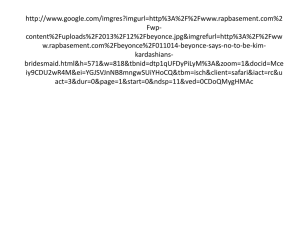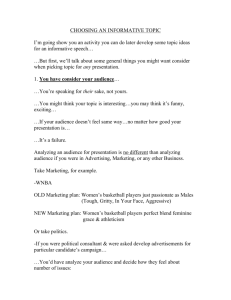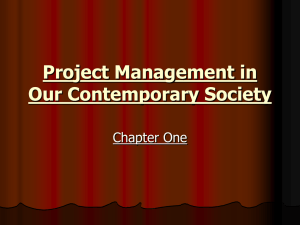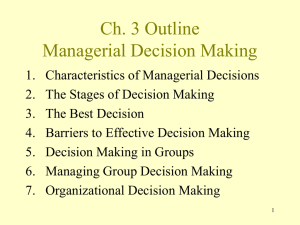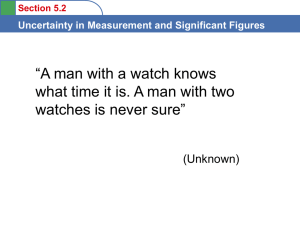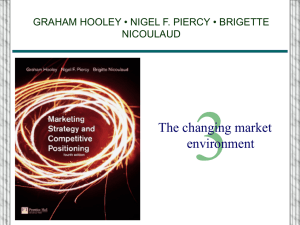Leading and Managing in Turbulent Times
advertisement
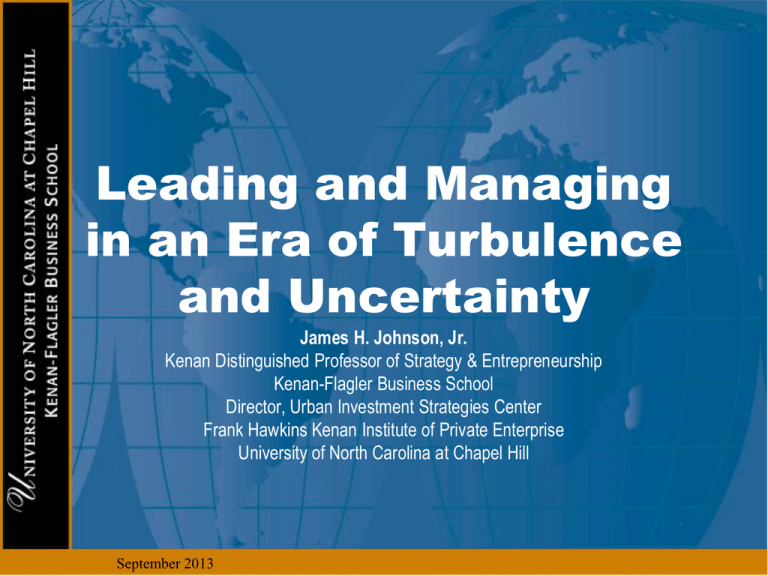
Leading and Managing in an Era of Turbulence and Uncertainty James H. Johnson, Jr. Kenan Distinguished Professor of Strategy & Entrepreneurship Kenan-Flagler Business School Director, Urban Investment Strategies Center Frank Hawkins Kenan Institute of Private Enterprise University of North Carolina at Chapel Hill September 2013 Overview The “New Normal” Drivers of Future Change Strategies for Leading and Managing in a Crazy World Discussion September 2013 The “New Normal” Uncertainty Insecurity Turbulence September 2013 Turbulent Times • 9/11 Terrorist Attacks Public Health Risks Gulf Coast Natural Disasters Recent U.S. Housing, Finance, & Credit Crises Earthquakes in Haiti, Chile, & China BP Oil Disaster Earthquake, Tsunami, Nuclear Reactor Crisis in Japan Global Economic Recession Political Gridlock in Washington Shifting Political Landscape in NC The Next Five Years “You think the past five years were nuts? You ain’t seen nothin’ yet. It’s only going to get weirder, tougher, and more turbulent. Which means that leadership will be more important than ever – and more confusing.” Tom Peters (2001) – available at http://fastcompany.com/magazine/44/rules.html September 2013 Strategies for Leading and Managing through LIMBO September 2013 Characteristics of Effective Leadership Vision and Integrity Perseverance and Courage Hunger for Innovation Willingness to take Risks Self-assurance Authenticity Ability to respond to contextual forces September 2013 Contextual Intelligence Acute sensitivity to the social, political, technological, and demographic context that define the current era … An unappreciated but all-encompassing differentiator between success and failure Source: Breen (2005) September 2013 A Sense of History is part of Contextual Intelligence “Leaders and those who aspire to lead benefit from having a sense of history… Not because history repeats itself. History’s real value is that it allows you to imagine what’s possible.” Nitin Nohria, Co-author In their Time: The Greatest Business Leaders of the 20th Century. September 2013 Leading Through LIMBO “Once in a while, getting knocked on your ass is a good thing.” William Nuti, CEO Symbol Technologies, Inc. Holtsville, NY September 2013 Urging people forward when their future is in doubt Communicate with mind-numbing consistency Be honest and forthright Display Conviction Encourage entrepreneurial thinking Reward Creativity and Innovation September 2013 Communicating Through LIMBO Tell people what’s going on, why it’s going on, and how it will affect them and the organization through: Quarterly Meetings Monthly Coffee Sessions Email Voice Mail Text messages When all else fails, send a pigeon! September 2013 Honesty is Always in Fashion If you are nervous, tell your employees you are nervous. If job cuts are a possibility, tell your staff so there are no surprises. Admit that you do not have all the answers. Maintain open line of communication with your direct reports. September 2013 Displaying Conviction in Uncertain Times People look for strength in leaders, particularly in times of uncertainty. Strength comes from your convictions – beliefs that you are willing to fight for every day. Having causes that are a part of you, that you are willing to fight for every day, that give you purpose – so that you never stop fighting – are key to surviving uncertainty. In the most trying moments is when real focus comes to you – trust your instincts. September 2013 New Competitive Landscape In the current era of uncertainty, “knowledge networks” are key to achieving results. Leadership no longer equals authority. Organizations need leaders at all levels. Source: AME Info (2004) September 2013 New Fundamentals of Leadership Be credible Create Clarity and Focus Build a Coaching Culture September 2013 Building Blocks of Credibility Consistency Concern for People Competency Commitment September 2013 Leadership Fundamental #1: Be Credible People who feel their leaders are credible are significantly more likely to feel pride in the organization, to feel strongly connected to their team, and to be committed to the organization’s goals and values. September 2013 Leadership Fundamental #2: Create Clarity and Focus Less than 5% of a typical employee group understand their organization’s strategy. Moving an organization forward means drawing a clear line of sight from your strategy to people’s actions. Answer the following questions: What is the overall strategy? What are the target outcomes sought and how are they measured? What actions do people need to take? September 2013 Leadership Fundamental #3: Build a Coaching Culture Traditional coaching model (1-on-1 relationships between managers and direct reports) likely to be unsuccessful in times of uncertainty. Knowledge networks involving a more eclectic group of individuals from different parts and different levels of the organization more likely to be effective or successful at navigating change. September 2013 Ways to be an Effective Leader in Freaked-Out Times The leader is rarely the best performer Leaders deliver Leaders win through logistics Leaders multitask Leaders groove on ambiguity Leadership is an improvisational art Leaders trust their guts September 2013 Ways to be an Effective Leader in Freaked-Out Times (cont’d) Leaders are good at forgetting Leaders bring in different dudes Leaders make mistakes – and make no bones about it Leaders know when to challenge design specs (organizational character) Leaders don’t create followers, they create more leaders Leaders love rainbows – for totally pragmatic reasons September 2013 Leading in a Crazy World – Selected Strategies Adaptability becomes the only survival mechanism. Unlearning traditional ways of approaching and solving problems. Develop capability to respond sensitively, nimbly, and quickly to turbulence and catastrophic change. September 2013 Leading in a Crazy World – Selected Strategies (cont’d) Learn to capitalize on the unexpected. Move quickly to distinguish yourself from your closest rivals. Afford people the opportunity to think “crazy” thoughts, create an environment where those thoughts are taken seriously, and watch where imaginations can lead you. September 2013 Implications for Leaders Change is the only constant you will face Speed, agility, and flexibility Voracious consumer of competitive intelligence Tenacity Persistence Entrepreneurial spirit Soft Skills Hard Skills September 2013
